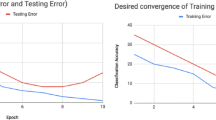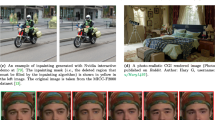Abstract
In the federated learning scenario, the private data are kept local, and gradients are shared to train the global model. Because gradients are updated according to the private training data, the features of the data are encoded into gradients. Prior work proved the possibility of reconstructing the private training data based on gradients. However, only a small batch of images can be recovered, and the reconstruction quality, especially against the large batch size of images, is unsatisfactory. To improve the quality of reconstruction of a large batch of images, a generative gradient inversion attack based on a regulation term is designed, which is called fDLG. First, a regulation term that can avoid drastic variations within image regions is proposed, which is based on the cognition that changes between image pixels are gradual. The proposed regulation term encourages the synthesized dummy image to be piece-wise smooth. Second, generative adversarial networks are trained to improve the quality of the attack with the global model used as a discriminator. Simulation shows that large batches of images (128 images on CIFAR100, 256 images on MNIST) can be faithfully reconstructed at high resolution, and even large images from ImageNet can be reconstructed.












Similar content being viewed by others
Data availability
The datasets generated during and/or analyzed during the current study are available from the corresponding author on reasonable request.
References
Cai Y, Yao Z, Dong Z, Gholami A, Mahoney MW, Keutzer K (2020) Zeroq: a novel zero shot quantization framework. In: Proceedings of the IEEE/CVF conference on computer vision and pattern recognition, pp 13169–13178
Chintala S (2021). soumith/dcgan.torch. https://github.com/soumith/dcgan.torch. original-date: 2015-12-02T02:52:08Z
Dean J, Corrado G, Monga R, Chen K, Devin M, Mao M, Aurelio Ranzato M, Senior A, Tucker P, Yang K, Le Q, Ng A (2012) Large scale distributed deep networks. In: Advances in neural information processing systems, Curran Associates, Inc
Fredrikson M, Jha S, Ristenpart T (2015) Model inversion attacks that exploit confidence information and basic countermeasures, In: Proceedings of the 22nd ACM SIGSAC conference on computer and communications security, pp 1322–1333
Geiping J, Bauermeister H, Dröge H, Moeller M (2020) Inverting gradients - how easy is it to break privacy in federated learning?. In: Larochelle H, Ranzato M, Hadsell R, Balcan MF, Lin H (eds) Advances in neural information processing systems, Curran Associates, Inc. pp 16937–16947
Goodfellow I.J, Pouget-Abadie J, Mirza M, Xu B, Warde-Farley D, Ozair S, Courville A, Bengio Y (2014) Generative adversarial networks. arXiv:1406.2661 [cs, stat]
Gulrajani I, Ahmed F, Arjovsky M, Dumoulin V, Courville A, (2017) Improved training of wasserstein gans. In: Proceedings of the 31st international conference on neural information processing systems, Curran Associates Inc., Red Hook, NY, USA. pp 5769–5779
Hayes J, Melis L, Danezis G, De Cristofaro E (2019) Logan: membership inference attacks against generative models. In: Proceedings on privacy enhancing technologies (PoPETs), De Gruyter. pp 133–152
He Z, Zhang T, Lee RB (2019) Model inversion attacks against collaborative inference. In: Proceedings of the 35th annual computer security applications conference, pp 148–162
Hitaj B, Ateniese G, Perez-Cruz F (2017). Deep models under the GAN: information leakage from collaborative deep learning, In: Proceedings of the 2017 ACM SIGSAC conference on computer and communications security, ACM, Dallas Texas USA. pp 603–618. https://doi.org/10.1145/3133956.3134012
Jeon J, Kim j, Lee K, Oh S, Ok J (2021) Gradient inversion with generative image prior. In: Advances in neural information processing systems, Curran Associates, Inc. pp 29898–29908
Karras T, Laine S, Aittala M, Hellsten J, Lehtinen J, Aila T (2020). Analyzing and improving the image quality of stylegan. In: Proceedings of the IEEE/CVF conference on computer vision and pattern recognition, pp 8110–8119
Keuper J, Preundt FJ (2016) Distributed training of deep neural networks: theoretical and practical limits of parallel scalability. In: 2016 2nd workshop on machine learning in HPC environments (MLHPC), pp 19–26. https://doi.org/10.1109/MLHPC.2016.006
Konečnỳ J, McMahan HB, Yu FX, Richtárik P, Suresh AT, Bacon D, (2016) Federated learning: strategies for improving communication efficiency. arXiv preprint arXiv:1610.05492
Long Y, Bindschaedler V, Wang L, Bu D, Wang X, Tang H, Gunter CA, Chen K (2018). Understanding Membership Inferences on Well-Generalized Learning Models. arXiv:1802.04889 [cs, stat]
McMahan B, Moore E, Ramage D, Hampson S, y Arcas BA (2017) Communication-efficient learning of deep networks from decentralized data. In: Artificial intelligence and statistics, PMLR. pp 1273–1282
McMahan B, Moore E, Ramage D, Hampson S, y Arcas BA (2017) Communication-efficient learning of deep networks from decentralized data. In: Artificial intelligence and statistics, PMLR. pp 1273–1282
Melis L, Song C, De Cristofaro E, Shmatikov V (2019) Exploiting unintended feature leakage in collaborative learning. In: 2019 IEEE symposium on security and privacy (SP), IEEE. pp 691–706
Miyato T, Kataoka T, Koyama M, Yoshida Y (2018) Spectral normalization for generative adversarial networks. arXiv preprint arXiv:1802.05957
Mordvintsev A, Olah C, Tyka M (2015) Inceptionism: going deeper into neural networks. Google AI Blog
Nasr M, Shokri R, Houmansadr A (2019) Comprehensive privacy analysis of deep learning: passive and active white-box inference attacks against centralized and federated learning, In: 2019 IEEE symposium on security and privacy (SP), IEEE, San Francisco, CA, USA. pp 739–753. https://doi.org/10.1109/SP.2019.00065
Nguyen A, Clune J, Bengio Y, Dosovitskiy A, Yosinski J (2017) Plug and play generative networks: conditional iterative generation of images in latent space. In: Proceedings of the IEEE conference on computer vision and pattern recognition, pp 4467–4477
Radford A, Metz L, Chintala S (2016) Unsupervised representation learning with deep convolutional generative adversarial networks. arXiv:1511.06434 [cs]
Salem A, Zhang Y, Humbert M, Berrang P, Fritz M, Backes M (2018) ML-leaks: model and data independent membership inference attacks and defenses on machine learning models. arXiv:1806.01246 [Cs]
Santurkar S, Tsipras D, Tran B, Ilyas A, Engstrom L, Mądry A (2019) Image synthesis with a single (robust) classifier. Curran Associates Inc., Red Hook
Shokri R, Shmatikov V (2015) Privacy-preserving deep learning. In: Proceedings of the 22nd ACM SIGSAC conference on computer and communications security - CCS ’15, ACM Press, Denver, Colorado, USA. pp 1310–1321. https://doi.org/10.1145/2810103.2813687
Shokri R, Stronati M, Song C, Shmatikov V (2017) Membership inference attacks against machine learning models. In: 2017 IEEE symposium on security and privacy (SP), IEEE, pp 3–18
Strom N (2015) Scalable distributed DNN training using commodity GPU cloud computing. In: Interspeech 2015, ISCA, pp 1488–1492. https://doi.org/10.21437/Interspeech.2015-354
Wang Z, Song M, Zhang Z, Song Y, Wang Q, Qi H (2019) Beyond inferring class representatives: user-level privacy leakage from federated learning. In: IEEE INFOCOM 2019 - IEEE conference on computer communications, IEEE, Paris, France. pp 2512–2520. https://doi.org/10.1109/INFOCOM.2019.8737416
Wang Z, Song M, Zhang Z, Song Y, Wang Q, Qi H (2019) Beyond inferring class representatives: user-level privacy leakage from federated learning. In: IEEE INFOCOM 2019-IEEE conference on computer communications, IEEE. pp 2512–2520
Wei W, Liu L, Loper M, Chow KH, Gursoy ME, Truex S, Wu Y (2020) A framework for evaluating gradient leakage attacks in federated learning. arXiv:2004.10397 [cs, stat]
Yang Q, Liu Y, Chen T, Tong Y (2019) Federated machine learning: concept and applications. ACM Trans Intell Syst Technol (TIST) 10:1–19
Yang Z, Chang EC, Liang Z (2019) Adversarial neural network inversion via auxiliary knowledge alignment. arXiv preprint arXiv:1902.08552
Yin H, Mallya A, Vahdat A, Alvarez JM, Kautz J, Molchanov P (2021) See through gradients: image batch recovery via gradinversion. In: Proceedings of the IEEE/CVF conference on computer vision and pattern recognition, pp 16337–16346
Yin H, Molchanov P, Alvarez JM, Li Z, Mallya A, Hoiem D, Jha NK, Kautz J (2020) Dreaming to distill: data-free knowledge transfer via DeepInversion. In: 2020 IEEE/CVF conference on computer vision and pattern recognition (CVPR), IEEE, Seattle, WA, USA. pp 8712–8721. https://doi.org/10.1109/CVPR42600.2020.00874
Zhang H, Goodfellow I, Metaxas D, Odena A (2019) Self-attention generative adversarial networks. In: International conference on machine learning, PMLR. pp 7354–7363
Zhang Y, Jia R, Pei H, Wang W, Li B, Song D (2020) The secret revealer: generative model-inversion attacks against deep neural networks. In: Proceedings of the IEEE/CVF conference on computer vision and pattern recognition, pp 253–261
Zhao B, Mopuri KR, Bilen H (2020). iDLG: improved deep leakage from gradients. arXiv:2001.02610 [cs, stat]
Zhao Y, Li M, Lai L, Suda N, Civin D, Chandra V (2018) Federated learning with non-iid data. arXiv preprint arXiv:1806.00582
Zhu L, Liu Z, Han S (2019) Deep leakage from gradients. In: Wallach H, Larochelle H, Beygelzimer A, d’Alché-Buc F, Fox E, Garnett R (eds) Advances in neural information processing systems. Curran Associates Inc
Funding
This work is sponsored by the National Key R &D Program of China (2022YFB3103100). This work is sponsored by the R &D Program of Beijing Municipal Education Commission (KM202210005028). This work is also supported by National Natural Science Foundation of China (62302020) and the Major Research Plan of National Natural Science Foundation of China (92167102). This work is also supported by the Importation and Development of High-Caliber Talents Project of Beijing Municipal Institutions (CIT &TCD20190308) and the “Engineering Research Center of Intelligent Perception and Autonomous Control, Ministry of Education.”
Author information
Authors and Affiliations
Corresponding author
Ethics declarations
Conflict of interest
The authors have no conflict of interest to declare that are relevant to the content of this article.
Human and animal rights statement
This article does not contain any studies with human participants or animals performed by any of the authors.
Additional information
Publisher's Note
Springer Nature remains neutral with regard to jurisdictional claims in published maps and institutional affiliations.
Rights and permissions
Springer Nature or its licensor (e.g. a society or other partner) holds exclusive rights to this article under a publishing agreement with the author(s) or other rightsholder(s); author self-archiving of the accepted manuscript version of this article is solely governed by the terms of such publishing agreement and applicable law.
About this article
Cite this article
Huang, Y., Chen, Y., Martínez-Ortega, JF. et al. Batch data recovery from gradients based on generative adversarial networks. Neural Comput & Applic (2024). https://doi.org/10.1007/s00521-024-09870-0
Received:
Accepted:
Published:
DOI: https://doi.org/10.1007/s00521-024-09870-0




